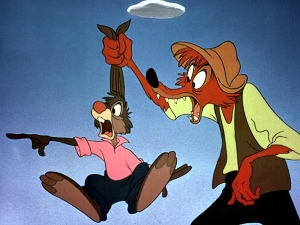[4]
For its racist stereotypes and sugar-coated depiction of plantation life in the post-Civil War South, Disney has locked away Song of the South from the public since its last re-release in 1986. I don’t think the film is any more offensive than countless others made before desegregation (Gone with the Wind among them). In fact, putting its social infractions in historical context is probably the most interesting thing about Song of the South.
If you’re going to lock the movie away, lock it away for mediocrity. The film’s an animated anthology with a live-action wraparound featuring Uncle Remus (James Baskett) telling a young boy stories of Br’er Rabbit, Br’er Fox, and Br’er Bear. The live-action parts are cheesy and melodramatic (think Brady Bunch) and the annoying animated sequences lack the character or charm of so many other Disney efforts. On the bright side, I’ve always enjoyed the Oscar-winning song “Zip-a-dee Doo Dah,” but its visual accompaniment is somewhat underwhelming.
Doe-eyed, baby-faced star Bobby Driscoll became a Disney regular for a while. He starred as Jim Hawkins in Disney’s Treasure Island, and in 1953 he provided the voice and live-action reference for Peter Pan. In the mid-60s, however, he fell into drugs and obscurity. His body was found by two children in an abandoned New York tenement and he was buried in an unmarked grave.
Academy Award: Best Song (“Zip-a-Dee-Doo-Dah!”), Honorary Oscar for James Baskett (for his able and heart-warming characterization of Uncle Remus, friend and story teller to the children of the world, in Walt Disney’s Song of the South)
Oscar Nomination: Best Scoring of a Musical Picture

